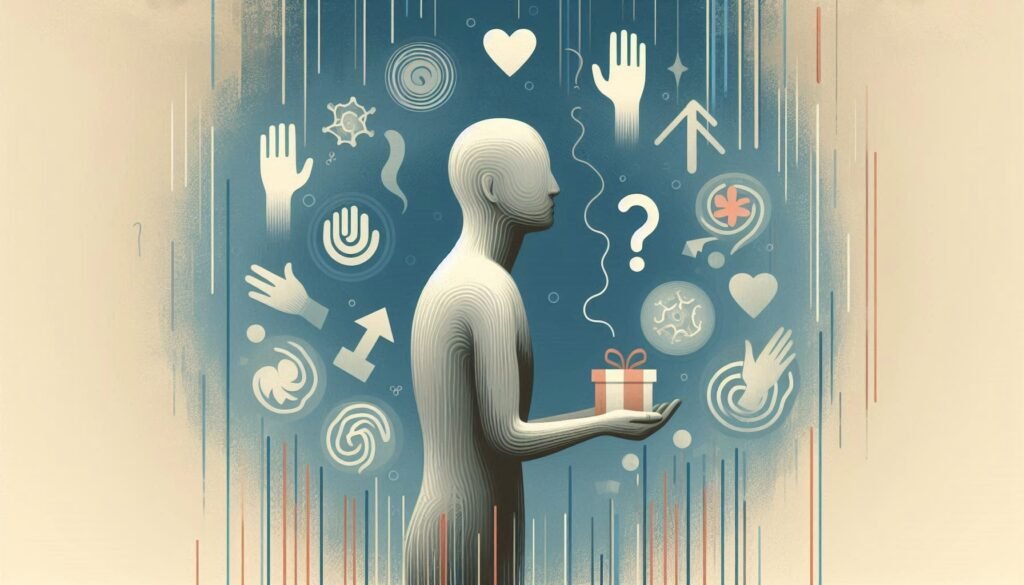Charitable giving is often seen as a selfless act, driven by an innate desire to help others. Yet, the underlying psychological factors that influence this behavior are complex and varied. One such factor is neuroticism—a trait characterized by emotional sensitivity, anxiety, and mood swings. At first glance, it may seem counterintuitive that those who experience heightened emotional turmoil might also engage in altruistic acts. However, research suggests a fascinating paradox: neurotic individuals can display both empathy and aversion to risk when it comes to charitable giving.
Understanding the impact of neuroticism on charitable giving and altruism not only sheds light on individual motivations but also offers insights for charities aiming to connect with diverse donors. By exploring how emotions shape our decisions about helping others, we can uncover patterns that reveal why some people give generously while others hesitate or falter in their contributions.
This exploration dives deep into the psyche of charitable givers affected by neurotic tendencies—illuminating paths for engaging them effectively in philanthropic activities. Join us as we unravel this intriguing relationship between personality traits and altruistic behaviors!

Understanding Neuroticism: Emotional Sensitivity and Prosocial Behavior
Neuroticism is a personality trait that encompasses emotional instability, anxiety, and heightened self-consciousness. Individuals high in neuroticism often experience intense emotions, making them more sensitive to stressors and interpersonal dynamics. This emotional sensitivity influences how they perceive the needs of others.
Despite their challenges with anxiety and mood fluctuations, neurotic individuals can exhibit strong prosocial behaviors. Their ability to empathize deeply allows them to connect with others’ suffering on an emotional level. In situations where someone is in distress, they may feel compelled to help alleviate that pain.
However, this sensitivity also comes with potential drawbacks. The fear of negative outcomes or rejection might inhibit their willingness to take action. As a result, while many neurotic individuals genuinely want to contribute positively through charitable giving or volunteering, internal fears can create barriers.
Understanding these nuances helps clarify the complex relationship between neuroticism and altruistic behavior. Recognizing both the strengths and vulnerabilities associated with this personality trait offers valuable insights into fostering effective engagement strategies for charitable organizations.
The Psychology of Charitable Giving: Motivations and Decision-Making Processes
Charitable giving is influenced by various psychological factors. Understanding the motivations behind donations can shed light on why individuals choose to support certain causes over others. Some people are driven by a sense of personal responsibility. They feel a moral obligation to help those in need, which propels them into action.
Emotions also play a significant role in decision-making processes related to charitable contributions. For many, feelings of empathy and compassion spark the desire to give. When individuals connect emotionally with a cause or its beneficiaries, they are more likely to contribute.
Additionally, social influences cannot be overlooked. Many donors are motivated by societal expectations or peer pressure. Seeing friends or family engage in philanthropy can inspire similar behavior, creating a ripple effect within communities.
Cognitive biases often shape how potential donors perceive their impact. They may focus on immediate outcomes rather than long-term effects, leading them toward quick and visible solutions instead of sustainable change initiatives.
Neuroticism and Empathy: The Double-Edged Sword in Altruistic Behavior
Neuroticism often influences how individuals perceive and respond to the emotions of others. People high in neurotic traits may experience heightened emotional sensitivity, allowing them to empathize deeply with those in need. This ability can drive altruistic behavior, as they feel compelled to help alleviate the suffering of others.
However, this heightened empathy comes with a downside. Neurotic individuals may become overwhelmed by their feelings or fear of negative outcomes. Such anxiety can hinder proactive charitable actions, leading to paralysis instead of engagement. They might want to help but struggle with self-doubt or worry about their impact.
The dual nature of empathy in neurotics creates a complex dynamic within altruism. While they have the potential for great compassion, their emotional turmoil can impede effective giving and volunteering efforts. Understanding this paradox is crucial for organizations seeking support from these individuals.
Recognizing that empathy is both a strength and vulnerability allows us to tailor approaches that encourage meaningful contributions without overwhelming neurotic donors or volunteers.
Risk Aversion and Donation Patterns in Neurotic Individuals
Neurotic individuals often exhibit higher levels of risk aversion, significantly influencing their donation patterns. This hesitance stems from a heightened sensitivity to potential negative outcomes. Fear of financial instability or emotional distress can deter them from making charitable contributions.
When considering donations, neurotics may overanalyze the effectiveness of organizations. They might question how funds will be used and whether they will truly make an impact. This cautious approach can lead to hesitation in committing to causes, which could diminish overall giving.
Interestingly, this risk-averse nature also creates unique donation behaviors. Neurotic individuals may opt for smaller, safer contributions rather than larger sums that feel overwhelming or uncertain. Their desire for control often translates into targeted giving where they feel their support has more tangible results.
Understanding these trends allows nonprofits to tailor their messaging effectively. By providing clear information on fund allocation and demonstrating measurable outcomes, organizations can better engage with neurotic donors seeking assurance in their philanthropic choices.
Emotional Contagion: How Neuroticism Influences Responses to Charitable Appeals
Emotional contagion refers to the phenomenon where individuals subconsciously mimic and adopt the emotions of those around them. For neurotic individuals, this can lead to heightened emotional responses when exposed to charitable appeals. They often feel a greater sense of anxiety or distress in reaction to others’ suffering.
When charities present cases that evoke strong emotional reactions, neurotic donors may respond with urgency. Their sensitivity amplifies feelings of compassion but also intensifies fears about not doing enough. This duality can compel them toward immediate action, fueling impulsive donations.
However, this same emotional responsiveness can create an overwhelming burden for neurotic givers. The pressure they place on themselves might lead to burnout or withdrawal from future charitable activities if their contributions don’t meet their self-imposed expectations.
Understanding how emotional contagion operates within neuroticism allows charities to tailor their messaging effectively. By striking a balance between evoking empathy and managing anxiety, organizations can foster positive engagement among these potential donors.
The Role of Anxiety in Charitable Decision-Making for Neurotic Individuals
Anxiety plays a critical role in shaping the charitable decision-making of neurotic individuals. For those who experience high levels of anxiety, the act of giving can trigger various emotional responses that complicate their choices. They may worry about whether their contributions are effective or if they’re making the right decision.
This heightened state of apprehension often leads to overthinking and second-guessing, which can hinder prompt action. Neurotic individuals might hesitate to donate due to fear of financial instability or concern about how their money will be utilized by organizations.
Conversely, anxiety can also spur altruism as a coping mechanism. Some people channel their worries into positive actions like supporting causes they care about deeply. This desire to alleviate personal distress through helping others adds a complex layer to understanding charitable behavior among neurotic donors.
Moreover, frequent exposure to emotionally charged appeals can intensify feelings of guilt for not contributing enough. Such pressures further impact their willingness and ability to engage with philanthropic opportunities effectively.
Social Responsibility and Guilt: Neuroticism’s Influence on Altruistic Obligations
Neuroticism often heightens feelings of social responsibility and guilt. Those with high levels of neurotic traits are sensitive to their surroundings, particularly in social contexts. This sensitivity can lead them to feel a strong obligation toward charitable causes.
When faced with societal issues or needs, neurotic individuals may experience intense guilt if they perceive themselves as not doing enough. This emotional response can be a driving force behind their altruistic behavior. They might donate more frequently out of fear that failing to contribute will reflect poorly on them.
However, this sense of obligation isn’t always straightforward. The pressure created by these emotions can lead to stress and anxiety about giving. Instead of fulfillment, they may find themselves feeling overwhelmed by the weight of their perceived responsibilities.
This complex relationship between neuroticism and feelings of guilt influences how these individuals engage with charitable organizations. Understanding this dynamic is key for charities aiming to connect meaningfully with potential donors who exhibit such traits.
Long-Term vs. Short-Term Giving: Neuroticism’s Impact on Commitment to Causes
Neuroticism influences how individuals commit to charitable causes, particularly when it comes to long-term versus short-term giving. Those high in neurotic traits often exhibit a heightened sense of anxiety and worry. This emotional sensitivity can lead them to hesitate before making substantial commitments.
Short-term giving might feel safer for neurotic individuals. They may prefer one-time donations, allowing them to alleviate feelings of guilt without the pressure of ongoing responsibility. In contrast, long-term commitments can evoke fears about future obligations or potential financial strain.
However, this doesn’t mean that neurotic individuals are incapable of sustained altruism. When they find causes that resonate deeply with their values or experiences, they may become passionate advocates over time. Such engagement often hinges on their ability to manage anxiety effectively.
Organizations looking to encourage long-term commitment should focus on creating supportive environments. Providing clear information about impacts and fostering community connections can help neurotic donors feel more secure in their philanthropic journeys.
Strategies for Engaging Neurotic Individuals in Philanthropic Activities
Engaging neurotic individuals in philanthropic activities requires understanding their unique emotional landscape. First, create a supportive environment where they feel safe to express their feelings and concerns. This can help alleviate any anxiety related to participating actively.
Second, tailor communication strategies that resonate with their sensitivity. Use clear messaging that emphasizes the impact of their contributions while addressing potential worries about effectiveness or outcomes. Highlighting success stories can bolster confidence in the cause.
Third, offer various ways for them to get involved beyond direct donations. Volunteer opportunities allow neurotic individuals to contribute at their own pace without overwhelming pressure. This flexibility encourages sustained engagement.
Build strong relationships through regular follow-ups and check-ins. Acknowledging both small achievements and larger milestones fosters a sense of belonging and purpose among neurotic donors or volunteers, reinforcing their commitment to philanthropy over time.
Cultivating Sustainable Altruism: Supporting Neurotic Donors and Volunteers
To effectively cultivate sustainable altruism among neurotic donors and volunteers, organizations must adopt a nuanced approach. Understanding the unique emotional landscape of these individuals is vital. By recognizing their sensitivity and heightened emotional responses, charities can tailor their engagement strategies.
Creating supportive environments that acknowledge emotions fosters trust. This includes offering clear communications that outline the impact of donations, which helps alleviate anxiety about decision-making. Additionally, providing opportunities for incremental giving or volunteering can reduce feelings of overwhelm while still allowing participation in philanthropy.
Regular feedback on how contributions make a difference plays an important role too. It reinforces positive feelings associated with giving while minimizing doubts and guilt often experienced by neurotic individuals. Furthermore, training staff to recognize signs of anxiety or distress enables them to respond appropriately and empathetically.
Encouraging community-building initiatives within charitable organizations can also be beneficial. When neurotic individuals feel connected to others who share similar values and concerns, they are more likely to engage consistently over time. These relationships help mitigate feelings of isolation commonly linked with high levels of neuroticism.
Fostering sustainable altruism requires commitment from both organizations and donors alike—supporting each other through understanding creates lasting change in charitable landscapes shaped by individual emotions.


